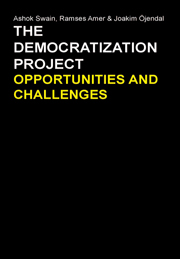Book contents
- Frontmatter
- Contents
- List of Tables
- List of Figures
- Acknowledgements
- Contributors
- The Democratization Project: Opportunities and Challenges
- 1 The Democratization Project: Peace, Conflict and Development
- 2 Non-Authorized Military Interventions and Legitimization by the United Nations
- 3 From Condemnation to Legitimization of Outcome: The United Nations and the Use of Force in Inter-State Relations
- 4 Demos or Deus: Patterns of Religious Dimensions in Asian Armed Conflicts, 1945–2005
- 5 The Left and Democratic Consolidation – Deepening Democracy in Latin America?
- 6 Democracy without People? – The Risk of Monopolizing the Democratization Project
- 7 The Role of Hamas in Building Palestinian Democracy in the Midst of Violence
- 8 Elections and Violence in Sri Lanka: Understanding Variation Across Three Parliamentary Elections
- 9 Post-Accord Elections and Armed Conflict
- 10 Peace Through Democracy? The Challenges of Postwar Democratization in Weak and War-Torn States
10 - Peace Through Democracy? The Challenges of Postwar Democratization in Weak and War-Torn States
Published online by Cambridge University Press: 05 March 2012
- Frontmatter
- Contents
- List of Tables
- List of Figures
- Acknowledgements
- Contributors
- The Democratization Project: Opportunities and Challenges
- 1 The Democratization Project: Peace, Conflict and Development
- 2 Non-Authorized Military Interventions and Legitimization by the United Nations
- 3 From Condemnation to Legitimization of Outcome: The United Nations and the Use of Force in Inter-State Relations
- 4 Demos or Deus: Patterns of Religious Dimensions in Asian Armed Conflicts, 1945–2005
- 5 The Left and Democratic Consolidation – Deepening Democracy in Latin America?
- 6 Democracy without People? – The Risk of Monopolizing the Democratization Project
- 7 The Role of Hamas in Building Palestinian Democracy in the Midst of Violence
- 8 Elections and Violence in Sri Lanka: Understanding Variation Across Three Parliamentary Elections
- 9 Post-Accord Elections and Armed Conflict
- 10 Peace Through Democracy? The Challenges of Postwar Democratization in Weak and War-Torn States
Summary
Introduction
How can donors and other external actors help to bring about durable peace and systems of governance based on democratic institutions and norms in developing countries that have experienced devastating civil wars? Democratization has become an integral part of contemporary peacemaking efforts to end civil wars. Because issues of failed governance and exclusive and discriminatory politics often are the root causes of internal conflicts, democracy is seen as the cure that may both resolve the issues at stake and simultaneously build the foundation for a peaceful postwar political order. The logic behind the view that democracy is a powerful peacebuilding device after intrastate war is that a democratic society is based on overarching principles, such as the right of all parties to exist and have a say, mutually agreed rules for the contest for power and a renunciation of violence as a method for resolving conflicts. As such, it enlarges the number of possible outcomes beyond losing the war or winning it. In theory, therefore, building peace through democracy is the ultimate route to sustainable peace and development in weak and war-torn states.
However, the empirical record of postwar democratization following the end of the Cold War era has demonstrated that this arranged marriage between peace and democracy has, in many cases, experienced serious difficulties, setbacks or even reversals. We argue that one of the key reasons for this oftentimes troubled relationship is the structural characteristics of the state itself in many parts of the developing world, which makes it difficult for the democratic project to work “as intended“.
- Type
- Chapter
- Information
- The Democratization ProjectOpportunities and Challenges, pp. 165 - 182Publisher: Anthem PressPrint publication year: 2009



